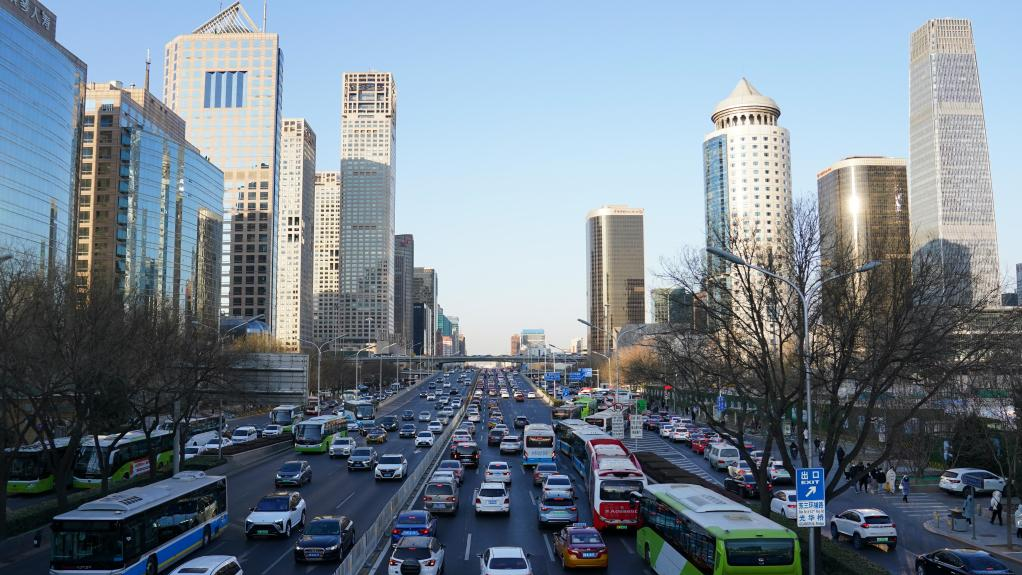
Vehicles run on Jianguo Road during morning peak hours in Chaoyang District of Beijing, capital of China, January 3, 2023. (Photo: Xinhua)
China's decision to downgrade its COVID-19 management in December and to reopen its borders with the rest of the world in January has led to important implications on the path to recovery of the world's second largest economy, starting in the early days of 2023.
Soaring outbound travel bookings over the weeklong Spring Festival holidays with southern China destinations as the biggest winners, record rail passenger journeys as millions of Chinese people traveled back to their homes to celebrate the Chinese New Year, the second highest-grossing to date box office numbers with Chinese-made blockbusters scoring massive profits, and surging sales in the 12 offshore duty-free shops in Hainan Province.
The tourism, film market, and retail sectors represent just the tip of the iceberg of a series of positive data that have surprised analysts and bankers who had previously delivered gloomy economic forecasts and have now promptly upgraded their outlook of the world's second largest economy and that of the global economy.
The optimization of the COVID response right before the Spring Festival holidays has had the effect of "re-energize" the Chinese market, along with a convergence of companies' stock valuations surge on capital markets, of the country's opening-up its domestic financial markets to foreign investors, and of the vitality of domestic consumption stemming from restored consumer confidence.
As consumption represents the largest component in the calculation of a country's gross domestic product (GDP), as well as one of the biggest determinants of economic health for a nation, it is easy to understand why China experts and analysts share optimistic outlook in respect of an economy that although only grew 3 percent for the full year of 2022, it is projected to expand to at least 5.5 percent this year, according to the economists of Goldman Sachs.
On January 28, China's State Council called for a sustained effort to promote a national economic rebound through an acceleration in consumption.
By making consumption the main driving force of the economy after three years of severe COVID-19 restrictions, the Chinese authorities' intent is clear. The stabilization of the economy, through the promotion of a growth that shifts from an old model of growth based on quantitative economic indicators to a more modern approach based on the achievement of high-quality and sustainable development, remains of paramount importance for the country's long-term goal to become a fully developed and prosperous country in correspondence of the 100th anniversary of the founding of the People's Republic of China.
While consumption has been identified as the main driver of economic growth for the foreseeable future, the promotion of opening-up of the domestic market and stabilization in foreign trade and investments remain equally important goals to be achieved.
China's grand reopening to the rest of the world would guide a dramatic increase in personnel exchange and to encourage people to study, work and do business across borders. This will lead to a higher level of consumption through tourism, and to a rise in the volume of cross-border trade and foreign direct investments.
The lack of people-to-people exchanges between China and foreign countries in the last three years, due to a reduced number of international flights and strict anti-pandemic quarantine requirements, have severely impacted the chances of business among nations and enterprises and critically reduced the accessibility of overseas investors to the world's largest consumer market.
Now, with China reopening its borders and reengaging with the rest of the world, commerce chambers, corporations, and investment institutions are planning business trips, and resuming operations and talent recruitment as they see in the newly announced policies a sign of long-term stability in the business environment of the world's second largest economy.
At the end of the day, it is all about confidence. When consumers or firms are confident in the future, they spend more money or to allocate more financial resources in a promising geographic region. This mechanism leads to higher economic growth, more employment opportunities and innovation, and increased level of prosperity.
China's decision to reconnect with the outside world marks the beginning of a whole new journey where overseas companies in almost every sector stand eager to reinforce their connection with the Chinese market as they see it as a lifeline that fuels global growth optimism to a world economy otherwise destined to recession.
(Matteo Giovannini is a finance professional at the Industrial and Commercial Bank of China in Beijing and a member of the China Task Force at the Italian Ministry of Economic Development. The article reflects the author's views and not necessarily those of People's Daily.)


